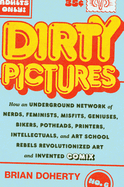
When artists working in a fringy form achieve a level of mass acceptance, have they necessarily sold out? Brian Doherty touches on this timeless art-scene question, among others, in his dense, diligent and, for any comix fan, indispensable history, Dirty Pictures.
As Doherty tells it, the repressive 1950s begat underground comix, whose practitioners often had a toe in the hippie, biker, rock and/or drug scenes of the 1960s. (The "x" in "comix," explains Doherty, marks the form as "distinct from the mainstream comics to which they were in opposition.") Comix had their glory days in the early 1970s, followed by a slump that resulted from, among other foils, distribution problems, legal challenges (for obscenity and copyright infringement) and the public's fickle taste.
Doherty (Radicals for Capitalism) gives Dirty Pictures the feel of an oral history through generous excerpts from his interviews with pioneers in the comix field. Among his best-known interviewees are "founding father" Robert Crumb, Alison Bechdel and Art Spiegelman. Spiegelman's Maus, which began in the pages of comix magazine Raw, went on to win a Pulitzer Prize in 1992 and made "graphic novel" a household term (for better or, in the eyes of some comix devotees, worse). Meanwhile, lesser-sung cartoonists slog on, finding--as Doherty puts it--"the will to keep going when the law, good sense, or their bank accounts might have told them to stop." --Nell Beram, author and freelance writer

